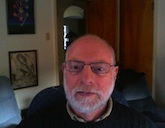Jeffrey Raff, Ph.D. is co-founder of the C.G. Jung Institute of Denver and a senior Jungian Analyst who has been in private practice in Denver since 1976. Trained in Zurich in the early 1970’s Dr. Raff is the author of four books, including Jung and the Alchemical Imagination, The Wedding of Sophia, and The Practice of Ally Work. He has written many articles on alchemy, the Kabbalah, and the nature of evil. Currently President of the C.G. Jung Institute of Denver Dr. Raff is also an adjunct professor at Pacifica Graduate Institute and a Training Analyst in the Interregional Society of Jungian analysts. and has taught numerous workshops and classes all over the country.
Check out the following Psychology CE Courses based on listening to Shrink Rap Radio interviews:
Jungian Psychotherapy Part 1 (6 CEUs)
Jungian Psychotherapy Part 2 (7 CEUs)
Jungian Psychotherapy Part 3 (7 CEUs)
Jungian Psychotherapy discounted Package of the Three Above (20 CEUs)
Wisdom of The Dream (4 CEUs)
Positive Psychology (6 CEUs)
Get our iPhone/Android app!
Discover these discount codes for you!: Angie’s List and 10% off on printer ink at 4inkjets and 10% off on Shoes and other apparel at ShoeBuy.com.
A psychology podcast by David Van Nuys, Ph.D.
Podcast: Play in new window | Download
Subscribe: Apple Podcasts | RSS

This was such a great episode. Jeffrey Raff and you really took a balanced, impressive and joyful tour into the interesting concept of active imagination. So far I have only heard of native American and Inuit shamanism and haven’t held it in high regard, but I’ve come to understand the depth and broadness of the topic better. By the way, I have received my copy of Jung’s The Red Book and a few others, naturally through your referral link. Merry christmas!
I’m not an expert, but I’m not sure I agree with Raff’s assessment that shamanic power comes from communing with spirits. It’s my understanding that the shamans power comes from the ability to journey through the spirit realms. I think this is an important distinction to make, if we are to understand psychology as the practice of bringing wholeness to the psyche… a fractured mind creates separate identities, “spirit guides”, in wholeness we are able to navigate the terrain between identities.
Dear Dr. Dave,
Your comment on the ally, ”one has to nurture and love the ally as well,” reminded me of something I began to grasp last summer but then forgot about: Jung’s autobiographical remark that the entities (all of them) of the unconscious are uninformed about our world. It is like nothing happens down there until we visit them! They are bored to death if they don’t get any news! This may sound like a nifty intellectual idea, but I had a vivid revelation during a shamanistic ceremony that confirmed this intuition on the experiential level. Although extremely powerful, it appears as if many of these beings are in a way starving unless we nurture them with ’soul food.’ (They also seem to have a childish or animal-like way of relating. You know, if a parent has been away from his or her child for too long, the kid may greet the parent with a mix of aggression and clinging, as if to punish the adult for the delay. After a while, the ’quarantine’ is over and they can start to relate normally again. The same seems to be the case with the creatures of the unconscious. The less attention I have payed them recently, the rougher the welcoming. But if I endure, they often become more friendly and cooperative. This goes for dreamwork, active imagination, hypnosis, as well as shamanistic work.)
And if the two worlds are symmetrical, why should one rule the other? It does not make sense. It feels humbling to think that the unconscious also needs our support and cooperation to evolve. It evokes a sense of responsibility and vigilance. Thank you for reminding me.
Thanks to all who made comments. As to the comments of Spirit, the shaman’s power derives from the ability to travel in the spirit’s realm, but also from the reason he goes there-to find souls and to commune with the spirits. I would recommend Eliade’s great work, Shamanism, which speaks to this and to the role of the spirit guides and allies. Ultimately power derives from the relationship with them.
Oskar S.-thanks for your insightful comments with which I totally agree. The world of the ordinary and the world of the spirit depend on each other, and it is the human being who knits them together through relationship to allies and spirits.
Dr Dave and Dr Raff: I thoroughly enjoyed the interview.
Dave- I wonder if some of the candy has been mistaken for the wrapper. It is so tempting to get caught up in the “otherness” of shamanism, and to overlook the effect. As I would define it, when I differentiate, I aid the Godhead to differentiate along with me.